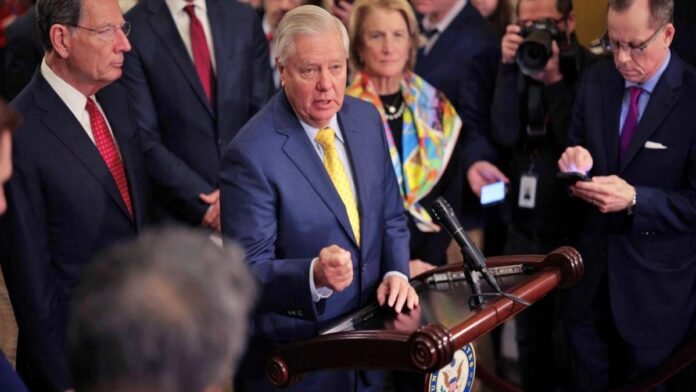
Key Points
- US Senate considers a bill to impose a 500% tariff on imports from countries purchasing Russian oil, targeting India, China, and others.
- Aim is to pressure nations to halt Russian oil trade and weaken Russia’s war economy amid the Ukraine conflict.
- India and China, as the largest buyers of discounted Russian crude, could face significant economic repercussions.
- Tariffs could extend to major Indian exports like pharmaceuticals, textiles, and IT services.
- Bill expected to be introduced in August 2025; could reshape global trade and energy alliances.
- India has benefitted from cheap Russian oil, stabilizing domestic prices and boosting exports.
Washington D.C: The United States is preparing to introduce a landmark bill that could dramatically reshape global trade, particularly for countries like India and China. According to Republican Senator Lindsey Graham, the proposed legislation would allow the US to levy a staggering 500 percent tariff on imports from any country that continues to buy products especially crude oil from Russia.
What’s in the Proposed Bill?
The bill, which is expected to be tabled in the US Senate in August, is designed to intensify economic pressure on Russia by targeting its trading partners. Senator Graham told ABC News,
“If you are buying any product from Russia and you are not helping Ukraine, then a huge tariff of 500 percent will be imposed on the products coming to America by you.”
This move is specifically aimed at countries that have maintained or increased their trade with Russia despite ongoing Western sanctions over the Ukraine conflict. Graham highlighted that India and China together purchase nearly 70 percent of Russia’s oil exports, thereby sustaining Russia’s war economy.
The Strategic Objective: Crippling Russia’s War Economy
The primary goal of the bill is to force countries to stop purchasing Russian oil, thereby cutting off a major source of revenue for Moscow and weakening its ability to continue the war in Ukraine. By threatening steep tariffs, the US hopes to isolate Russia economically and push it towards a peace agreement.
Potential Impact on India and China
If passed, the bill could have significant economic consequences for India and China, the two largest buyers of discounted Russian crude oil since the Ukraine war began. Both countries have leveraged cheap Russian oil to:
- Lower their energy import bills
- Boost exports of refined petroleum products
- Maintain stable domestic fuel prices during global crises
However, the new US tariffs could extend beyond oil, potentially affecting major export sectors such as pharmaceuticals, textiles, and IT services key drivers of India’s economy.
India’s Russian Oil Advantage at Risk
Since Western sanctions isolated Russia from many global markets, India has emerged as a major buyer of Russian crude, often at prices well below international benchmarks. This has allowed India to:
- Save billions on energy imports
- Increase exports of refined fuels
- Keep inflation and domestic fuel prices in check, even during global disruptions like the Middle East crisis and the ongoing Ukraine war
A 500% US tariff could undermine these economic gains and force India to reconsider its energy and trade strategies.
Global Trade and Diplomatic Fallout
The proposed bill is likely to increase tensions between the US and its trading partners, especially those in Asia. It could also lead to retaliatory measures, disrupt global supply chains, and complicate ongoing diplomatic efforts to resolve the Ukraine conflict.
What Happens Next?
The bill is expected to be introduced in the US Senate by August 2025. If passed, it would mark one of the most aggressive economic measures yet taken against countries supporting Russia’s economy. The world will be watching closely as India, China, and other affected nations weigh their options and respond to this new challenge.





















































